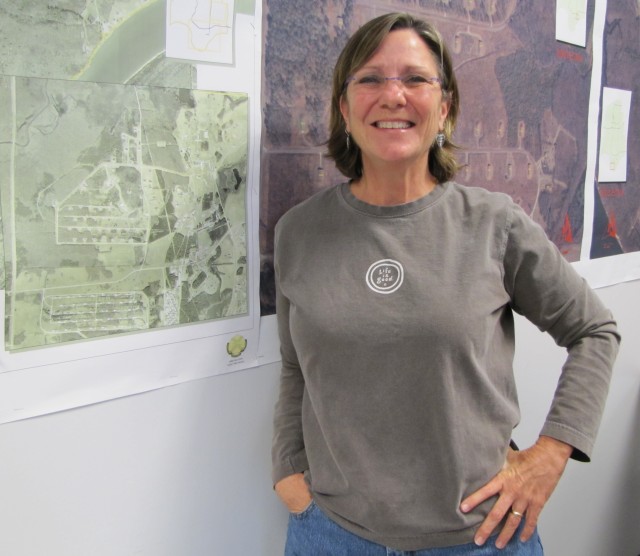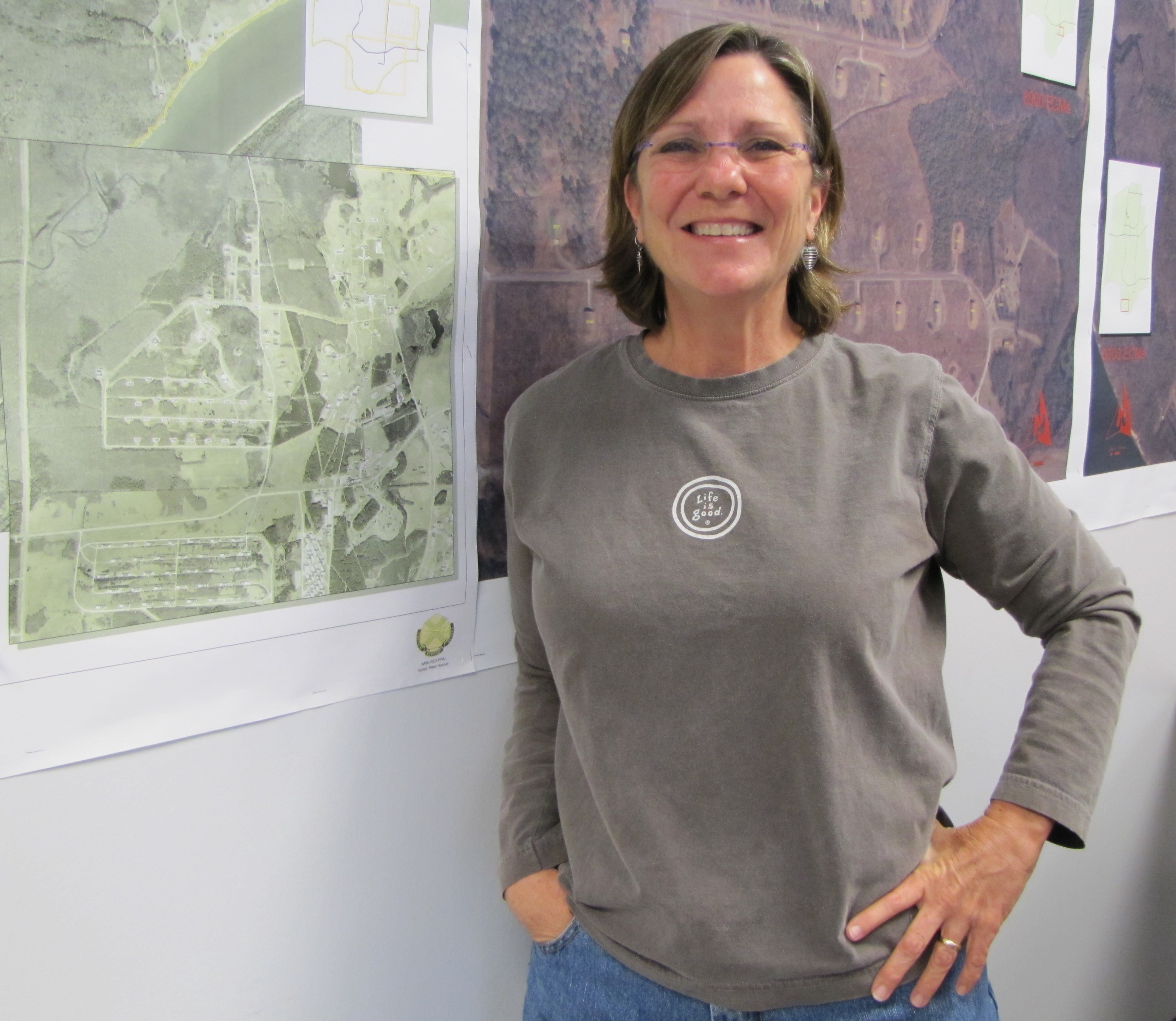REDSTONE ARSENAL, Ala. -- A wandering spirit - combined with the desire to help Soldiers - took the Garrison\'s Angela Bailey halfway around the world. As a quality assurance specialist (ammunition surveillance) - or QASAS - employee and an Air Force Reserve master sergeant, Bailey has had plenty of opportunities to travel with her work. She added Iraq to her list of destinations during a six-month tour where she worked at two ammunition supply points - with three months in Talil and the other three months in Balad. She returned in late November. "Like the military, they need QASAS employees to cycle through and go to Iraq," Bailey said. "I had a very strong feeling of obligation to go to Iraq. Eventually, I would have been assigned to deploy. Sometimes it's better to pick the time that's best to go and volunteer. You're more in control that way and you can prepare yourself better." QASAS employees, who are trained at the Defense Ammunition Center in McAlester, Okla., are charged with inspecting the quality and reliability of the Army's ammunition stockpile. They sign a mobility agreement that states they will relocate every three to five years. Bailey was assigned to Redstone Arsenal's Garrison in July 2008 to inspect the ammunition used by Soldiers in training and the missiles used in testing as well as the ammunition stored in the earth-covered magazines that dot the south side of the Arsenal. Before that, she was assigned to the Anniston Army Depot. In May 2009, she volunteered for a deployment to Iraq, where she worked for the Army Materiel Command to inspect all types of ammunition, including grenades, shoulder-fired rockets, mortar rounds and tank rounds, before assigning it to Soldier units. "In Iraq, we worked 12 hour days, seven days a week. We did tons and tons and tons of ammunition inspections," she said. "There was a lot of work outside. You see so much in that kind of environment. We inspected all items coming in and going out to the units. You had to make sure everything you were giving the Soldiers is serviceable, in good condition and not hazardous." When Soldiers returned from missions, they were required to turn in their unused ammunition for inspection. Undamaged ammunition was returned to the inventory for reissue on another mission. But items such as mishandled or dropped rocket motors, dropped and damaged Hellfire missiles, ammunition with broken links and ammunition with serial numbers rubbed off had to be removed from inventory. "I worked with Soldiers and Army civilians," Bailey said. "The ammunition was pretty much the same from one place to another. It was pretty much all missiles and rockets and signal flares. But, at Talil and Balad, the bases themselves were very different. "Talil is brown and flat, and really far south. Balad is busier. It's greener and not as flat. You can see farmers with sheep in their fields, and little kids playing and working in the fields." Bailey enjoyed working with Soldiers, so much so that she hopes to return to Iraq for a second deployment. "There's no way to mentally prepare yourself for 12 hour days, seven days a week. But you just get used to it," she said. "You get to so do much, and you get to help and make a difference. I really enjoy that." Bailey said everyone - Soldiers, civilians and contractors - can learn a lot about themselves and others from participating in a deployment. "Anyone deploying should use their deployments as an opportunity to learn. They should take pride in their work, no matter what it is, because it will affect other people," she said. "And keep an open mind because nothing is ever all bad." For civilians or contractors who are deploying, Bailey suggested they get in touch with who they will be working for to find out about the living and working conditions, and the things they should take with them on deployment. "I took too much stuff with me when I deployed," she said. "If I did it all over again I would take four to six lightweight cargo pants, 10 T-shirts and good running shoes. I would also take my teddy bear and a very nice set of sheets." Bailey enjoyed the camaraderie and teamwork that she and other civilians shared with Soldiers. "I was surprised about the community - the sense of community - among U.S. military, several foreign militaries, DoD/DA civilians and contractors," Bailey said. "There's a huge amount of people there, ages 17 to 70, and some have been there for years. It was astounding to see so many people from so many different countries and cultures all working together. There are a lot of good people in this world." Although most of her time was spent working, Bailey recalled two highlights of her deployment - one involving a simulation and the other a trip in a helicopter. "Our boss wanted us to go through MRAP (Mine Resistant Ambush Protected) vehicle roll-over training," she said. "So, we put on the gear and went through the MRAP simulation. The MRAP rolled over and then we had to be able to get out of it. "The other thing that was really neat was, right before I left to come home, I was flown down to Baghdad in a Black Hawk. It was my first time in one. It was very, very nice and very exciting. I also saw some of the palaces." The only downside of the deployment, she said, was missing her husband, and not being home to enjoy her Martin houses and gardening at her Huntsville home. Bailey's career in the munitions field began in 1981, when she left her college studies in civil engineering to enlist in the Air Force. One of the first things she had to do was choose a military occupational specialty. "At the time, I just didn't know what I wanted to do," she said. "They suggested munitions specialist, so that's where I ended up. It was such a man's career field. But when they started telling me I'd never make it, I dug in my heels and I've been doing this ever since. I'm stubborn that way. I also enjoy hard work and being outside. I've always been sort of a tomboy." She spent 13 years in the active Air Force, during which she served in such places as Andersen Air Force Base, Guam; Abu Dhabi Air Force Base; Davis-Monthan Air Force Base, Tucson, Ariz.; Nellis Air Force Base, Nev.; and Moody Air Force Base, Ga. But, as a single parent of a then 7-year-old daughter, Bailey decided to leave the Air Force so they could settle down in Florida. After working odd jobs - driving a dump trunk, cleaning houses and digging foundations for construction sites - Bailey was hired by the U.S. Post Office. "I wanted my daughter to get to know her family. When she was little, we were always overseas or in Arizona," said Bailey, referring to her now grown daughter, Wendy, who works at the Arts and Crafts Center. "My parents live in Rainsville. So, we transferred from Florida to Huntsville in 1998. But by 2001, I was getting a little stir crazy. I still wanted to do things and see new places." She rejoined the Air Force as a reservist in 2001. She is assigned to an Air Force Reserve Ammunition Team at Hill Air Force Base, Utah, and she drills at the Bluegrass Army Depot, Ky. She often takes temporary assignments at various Air Force bases where QASAS expertise is needed, such as Oson, Korea, United Arab Emirates and Diego Garcia AFB, Indian Ocean. She's worked on upgrades on the Joint Direct Attack Missile and other missile programs. "We do a lot of maintenance and inspection," she said. "On systems that are unserviceable, we will fix them and put them back into serviceable condition." Deploying to Iraq fulfilled two of Bailey's dreams - to see different parts of the world and to be a hands-on contributor in support of Soldiers in overseas contingency operations. "I really, really love to travel and see new stuff and do new stuff. If there's a place I haven't been I want to go," she said. "Then there's the satisfaction of helping Soldiers. If you can help protect these guys and teach these guys about their munitions, you know you've made a difference. Soldiers rely on us to make sure they get the ammunition, signal flares and other munitions that they need to do their mission. They rely on us to make sure they are serviceable when they need them."
Answering The Call Of A Wandering Spirit
By Kari Hawkins, USAG RedstoneJanuary 8, 2010




Social Sharing